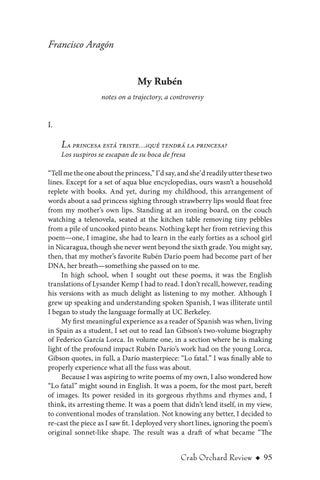Francisco Aragón My Rubén notes on a trajectory, a controversy
I.
La princesa está triste…¿qué tendrá la princesa?
Los suspiros se escapan de su boca de fresa
“Tell me the one about the princess,” I’d say, and she’d readily utter these two lines. Except for a set of aqua blue encyclopedias, ours wasn’t a household replete with books. And yet, during my childhood, this arrangement of words about a sad princess sighing through strawberry lips would float free from my mother’s own lips. Standing at an ironing board, on the couch watching a telenovela, seated at the kitchen table removing tiny pebbles from a pile of uncooked pinto beans. Nothing kept her from retrieving this poem—one, I imagine, she had to learn in the early forties as a school girl in Nicaragua, though she never went beyond the sixth grade. You might say, then, that my mother’s favorite Rubén Darío poem had become part of her DNA, her breath—something she passed on to me. In high school, when I sought out these poems, it was the English translations of Lysander Kemp I had to read. I don’t recall, however, reading his versions with as much delight as listening to my mother. Although I grew up speaking and understanding spoken Spanish, I was illiterate until I began to study the language formally at UC Berkeley. My first meaningful experience as a reader of Spanish was when, living in Spain as a student, I set out to read Ian Gibson’s two-volume biography of Federico García Lorca. In volume one, in a section where he is making light of the profound impact Rubén Darío’s work had on the young Lorca, Gibson quotes, in full, a Darío masterpiece: “Lo fatal.” I was finally able to properly experience what all the fuss was about. Because I was aspiring to write poems of my own, I also wondered how “Lo fatal” might sound in English. It was a poem, for the most part, bereft of images. Its power resided in its gorgeous rhythms and rhymes and, I think, its arresting theme. It was a poem that didn’t lend itself, in my view, to conventional modes of translation. Not knowing any better, I decided to re-cast the piece as I saw fit. I deployed very short lines, ignoring the poem’s original sonnet-like shape. The result was a draft of what became “The
Crab Orchard Review
u
95
